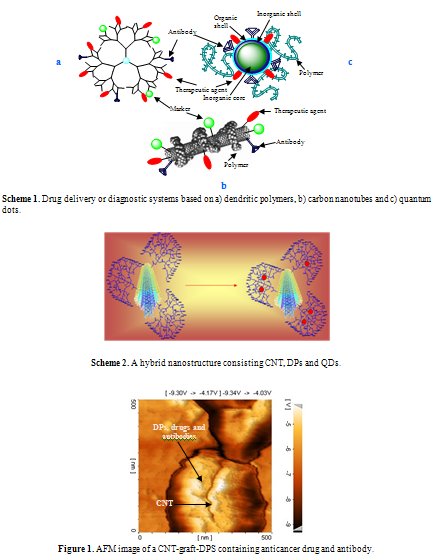|
Plenary
Lecture
Cancer Therapy Based on Hybrid Nanostructures

Assistant Professor Mohsen Adeli
Co-author: Fatemeh Zabihi
Department of Organic Chemistry, Faculty of chemistry
Sharif University, Tehran, IRAN
Adeli@sharif.ir
Abstract: Cancer is one of the top three ''killers''
in the world which include cardiovascular diseases.
Unfortunately treatment options for cancer patients are
not effective and in the most cases these options lead
to destruction the healthy tissues more than tumors. A
promising strategy to overcome this problem is
development of the effective delivery systems, for
therapeutic and diagnostic agents, based on
nanomaterials and nanostructures. This strategy is
called "nanomedicine".
To be an effective and perfect delivery system,
nanostructures should have several characteristics.
i) High functionality to conjugate multiple diagnostic
and therapeutic agents on their surface and to have
effective interaction with target cells.
ii) Ability to cross different barriers, especially cell
and perinuclear membrane, in body
iii) Biocompatibility and water solubility
iv)Inertness against biological active molecules
v) No immunogenicity effect
vi) Stability in biological systems
vii) Release diagnostic and therapeutic agents in
destination organelles
vii) Break down to biocompatible materials in
destination organelle and …
There are three classes of nanomaterials which promise
to be particularly capable agents in the detection,
diagnosis, and treatment of cancer (Scheme 1).
i) dendritic polymers (DPs), ii) carbon nanotubes (CNTs)
and iii) quantum dots (QDs)
Although delivery systems based on these nanomaterials
are valuable and sometimes effective, but they suffer
several disadvantages and can not taken into account as
perfect delivery systems for drugs or diagnostic agents.
However a very young and promising strategy to overcome
disadvantages of above delivery systems and produce
perfect targeted delivery systems for drugs or
diagnostic agents is to make hybrid systems containing
all mentioned nanomaterials. This strategy leads to new
nano-scale materials called "hybrid nanostructures".
Hybrid functional nanostructures containing CNTs, DPs
and QDs are synthesized and characterized by our group
recently (Scheme 2) [1]. Short-term in vitro
cytotoxicity and hemocompatibility tests has been
conducted on HT1080 cell line (human Fibrosarcoma), in
order to investigate their potential application in
nanomedicine and to understand the limitation and
capability of hybrid materials as nanoexcipients in
biological systems. According to the results of the in
vitro cytotoxicity tests and hemolysis assay, negligible
adverse effects on the HT1080 cell and also red blood
cells up to 1 mg/ml concentration were observed.
Anticancer drugs and antibodies were attached to the
functional groups of hybrid nanomaterials and their
potential application to kill different cancer cells in
vitro conditions was investigated (Figure 1).

Brief Biography of the Speaker:
Mohsen Adeli is Ph.D in the Hybrid Nanostructures and
their applications in nanomedicine at the Sharif
University of Technology (Tehran, Iran). After a PhD in
2005 from the Tabriz University and a postdoctoral
research in the Institute for Nanoscience and
Nanotechnology of Sharif University of Technology he
became assiatant proffesor of chemistry at Lorestan
University. His research is focused on synthesis and
charactrization of hybrid nanostructures containing
dendrimers, carbon nanotubes, quantum dots and
polyrotaxanes and their applications for cancer therapy.
Mohsen Adeli (born in Khoramabad, Iran in 1974) received
his undergraduate degree in Chemistry in 1996 at the
Lorestan University. He obtained his MS and PhD degree
cumlaude in 1998 and 2005 at the Tabriz University
respectively. He performed his Ms research in the field
of polymer chemistry which was include synthesis of new
types of living polymers containing 2,5-norbornadien and
ethyl methacrylate monomers and preparation of di- and
tri-block copolymers under the supervision of professor
Ali akbar Entezami. He performed his PhD research in the
field of organic chemistry with a study on the synthesis
and characterization of biocompatible dendrimers and
dendritic polymers under the supervision of professor
Hassan Namazi. Mohsen Adeli started his carrier at
Lorestan University in 2005, where he was active as
assistant professor in the field of functional hybrid
nanomaterials, including carbon nanotubes and dendritic
polymers. Then he introduced to the Institute for
Nanoscience and Nanotechnology of Sharif University of
Technology for a postdoctoral research in 2007, where he
initiated a research work on the hybrid functional
nanomaterials, including dendritic polymers and quantum
dots. He is assistant professor of Faculty of Chemistry
of Sharif University of Technology now.
|

